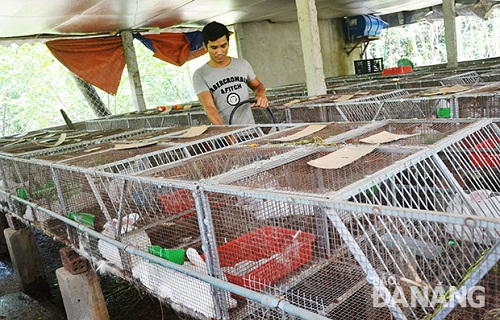Positive results from technological applications in agriculture
The past 15 years have seen positive results from a national programme to support technological applications and its transfer in rural and mountainous areas to further their socio-economic development.
Under the programme, a total of 845 projects and 2,501 business models have been implemented across the country at a total cost of 2,745 billion VND. In addition, 11,063 technological employees, 1,725 managers involved in the scientific and technological sector, and 236,264 farmers nationwide have attended training courses in promoting technological applications in agricultural production. Also, job opportunities have been offered to 128,643 job seekers from rural and mountainous areas.
 |
| Breeding New Zealand white rabbits in a local mountainous area |
In Da Nang, 13 technological support projects have been carried out effectively. Seven of them are under the management of the central government whilst the remainder are under the control of the municipal authorities.
Most notably, a central government-funded project has been deployed in the city to use the plant tissue culture method to grow a variety of plants. Plant tissue culture is used to produce clones of a plant in a method known as micro-propagation. It offers certain advantages over traditional methods of propagation, such as making exact copies of plants that produce particularly good flowers or fruits, or those with other desirable traits. The city’s biotechnology centre has also been established.
In addition, the local authorities have successfully implemented a project to promote the use of a substance called anolyte, an activated solution produced by electro-chemical activation, to ensure veterinary hygiene. Projects to promote biotechnological applications in the production of foodstuffs for shrimps and fish, and in the manufacture of disinfectants to prevent epidemics in livestock and poultry farming activities, have also been deployed effectively in the city.
Many local rural areas have seen positive results from models to raise Lai Sind cows, a combination of the local breed and the Red Sindhi breed, and New Zealand white rabbits along with techniques to grow types of flowers with a high economic value.
119 employees from the local scientific and technological sector have been trained in technological applications, whilst 3,775 local farmers have been introduced to advanced breeding and cultivation techniques.
The Deputy Director of the municipal Department of Science and Technology, Mr Nguynh Van Ngo, remarked that the projects mentioned above have promoted technological applications in local agricultural production to improve productivity and the quality of local agricultural products. Over recent years this has helped to improve economic efficiency, speed up poverty reduction, create more employment for job seekers, and improve local farmers’ incomes.